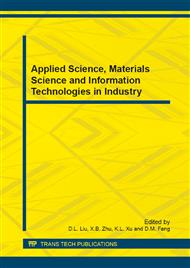p.2548
p.2552
p.2556
p.2560
p.2565
p.2569
p.2573
p.2577
p.2583
Algorithm Research Based on Distributed Water Multi-Level Resources Scheduling
Abstract:
With the rapid development of hydropower in China, there are a lot of reservoirs under constructions are put into operation. Therefore, resource scheduling of distributed water conservancy project has become a key focus in current researches. Based on distributed water multi-level resources, the paper put forward to apply the improved genetic algorithm to reservoir resource scheduling. In this way, water level sequence can be the basic genetic algorithm coding scheme, and storage status of reservoir can be stored with the array. Then the genetic algorithm coding can be operated based on the corresponding array index of each reservoir. The paper tries to prove the feasibility of this scheduling policy with some examples, simplifying the process of scheduling algorithm and providing guiding basis for water resource scheduling.
Info:
Periodical:
Pages:
2565-2568
Citation:
Online since:
February 2014
Authors:
Keywords:
Price:
Сopyright:
© 2014 Trans Tech Publications Ltd. All Rights Reserved
Share:
Citation:


